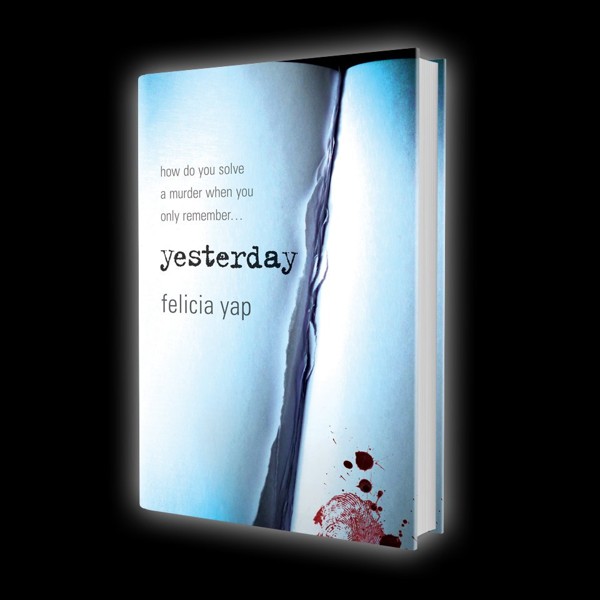
Review | Book review: Felicia Yap’s thriller Yesterday turns lens on digitally obsessed society struck by short-term memory loss
In Malaysia-born author’s futuristic murder mystery, a quick-paced summer read filled with action, intrigue and sex, characters’ brains reboot after 24 and 48 hours, meaning all memories have to be logged in a digital diary

Yesterday
By Felicia Yap
Mulholland Books
4/5 stars
Yesterday, the debut novel by Malaysia-born author Felicia Yap, is perfect summertime reading for sci-fi geeks and murder mystery fans.
This thriller is set in idyllic Cambridge, England, where Mark Henry Evans, a successful novelist and aspiring politician, lives in a spacious mansion with his pretty blonde wife, Claire.
The twist is that, in this alternative reality, nobody has long-term memory. The world is divided into “Duos”, who can remember things for two days, and the inferior “Monos”, who can only recall events for one day. In a society entirely dependent on technology, the human brain essentially crashes every 24 or 48 hours, and needs to be rebooted.
Lisa Ko’s emotive debut novel The Leavers explores heartbreak and identity in two Americas
People do retain basic facts about themselves – names, spouses, jobs, addresses – so that society can at least function. But most short-term memories are stored in devices called iDiaries, in a not-too-subtle jab at the ubiquitousness of Apple. Every night, responsible citizens update that day’s details into their iDiaries, which the authorities may or may not be keeping under surveillance. The next morning, the world’s citizens reach for the glowing iDiary on their kitchen counters, to catch up with where they left off with their lives.
Kevin Kwan’s Rich People Problems hustles his comic trilogy to a neat conclusion
The story starts with Claire Evans, who knows she has been trapped at home in a sobbing, hysterical state for 24 hours, although she cannot figure out the reason, only that it was “something nightmarish”. She did not record it in her iDiary, so the details of that trauma are gone from her mind forever.

Her husband knows – since he is a Duo – but he’s not telling.
The couple are rattled by the morning news on the radio, which reports that a woman was found drowned near their home in the River Cam. Soon enough, the police are on their doorstep, questioning Mark about his relationship to the mysterious murdered blonde, whom they identify as Sophia Alyssa Ayling.
Weike Wang’s Chemistry charts a Chinese American woman’s toxic reaction to stress with humour
The author has already teased the reader with a description of Sophia in the book’s prologue, set two years before the murder. Sophia describes herself as a once-plain girl, with “a flat chest and protruding ears”, who spent 17 years in an insane asylum. Now that she is free and rich, she plans on transforming herself into a seductress and murderer who will seek revenge on her rivals.
Sophia thinks she is the only known person on earth to have a full memory, meaning she feels she can literally get away with murder.
Yesterday is an obvious parody of England’s class system. “Duos”, such as Mark Evans, are university-educated professionals who own tech companies, run governments, and go on tropical vacations. “Monos” are basically white trash, depicted here as ex-strippers, low-level cops, and people with tattoos.
If a “Mono” girl is blessed with beauty – and in this book, that invariably means being a peroxided and Botoxed Barbie with implants – then maybe that “Mono” girl can marry a “Duo”.
Yesterday is also a commentary on modern society, where people use their phones as alarm clocks, calendars, cameras, entertainment, news feed and messengers.

Murder mysteries generally involve a lot of questions: “Where were you last Wednesday? Have the neighbours been acting strangely? Is there a clue to be found in your home?” Only in Yesterday, the characters have to answer each query by doing a keyword search on their iDiaries and then staring into screens. Yap has created a carnival fun-house mirror reflection of our digitally obsessed lives.
If there is one weakness in this debut novel, it is that the characters are not particularly deep or likeable. Sophia may be a fascinating, murderous beauty – but she is also vain, superficial and foul-mouthed, and there are only so many descriptions of her lingerie and stilettos a reader can take.
Mark, although redeemed in part by the end, spends much of his time being pompous and vaguely terrible to his wife.
Book review: a new contender for the Great Chinese-American Novel
One feels far more sympathy for side characters such as Hans Richardson, a police detective who is secretly a Mono but has passed for a Duo thanks to his amazing ability to solve cases in the 24 hours before his memory fails him. Same goes for Claire, the hapless Mono trophy wife who turns out to be more interesting than she first seems.
Ultimately, Yesterday doesn’t make any earth-shattering revelations about society, technology or memory – but it doesn’t have to. It’s a quick-paced summer read filled with action, intrigue and sex, with a futuristic twist that keeps it original.
